初中英语公开课翻译讲义
初中英语说课稿中文版(通用5篇)
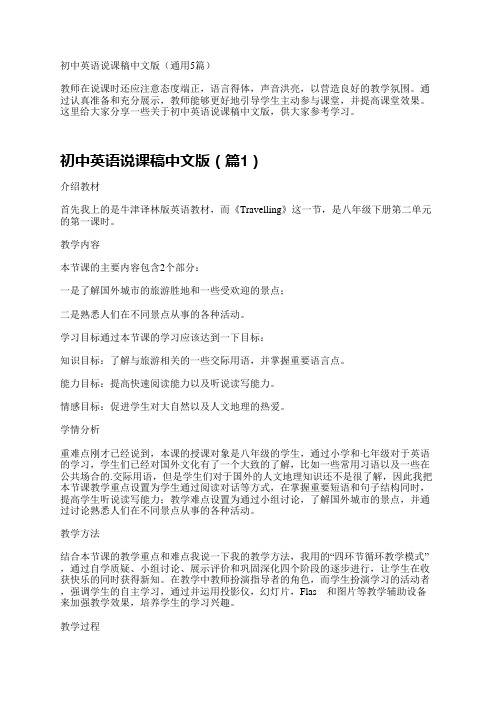
初中英语说课稿中文版(通用5篇)教师在说课时还应注意态度端正,语言得体,声音洪亮,以营造良好的教学氛围。
通过认真准备和充分展示,教师能够更好地引导学生主动参与课堂,并提高课堂效果。
这里给大家分享一些关于初中英语说课稿中文版,供大家参考学习。
初中英语说课稿中文版(篇1)介绍教材首先我上的是牛津译林版英语教材,而《Travelling》这一节,是八年级下册第二单元的第一课时。
教学内容本节课的主要内容包含2个部分:一是了解国外城市的旅游胜地和一些受欢迎的景点;二是熟悉人们在不同景点从事的各种活动。
学习目标通过本节课的学习应该达到一下目标:知识目标:了解与旅游相关的一些交际用语,并掌握重要语言点。
能力目标:提高快速阅读能力以及听说读写能力。
情感目标:促进学生对大自然以及人文地理的热爱。
学情分析重难点刚才已经说到,本课的授课对象是八年级的学生,通过小学和七年级对于英语的学习,学生们已经对国外文化有了一个大致的了解,比如一些常用习语以及一些在公共场合的.交际用语,但是学生们对于国外的人文地理知识还不是很了解,因此我把本节课教学重点设置为学生通过阅读对话等方式,在掌握重要短语和句子结构同时,提高学生听说读写能力;教学难点设置为通过小组讨论,了解国外城市的景点,并通过讨论熟悉人们在不同景点从事的各种活动。
教学方法结合本节课的教学重点和难点我说一下我的教学方法,我用的“四环节循环教学模式”,通过自学质疑、小组讨论、展示评价和巩固深化四个阶段的逐步进行,让学生在收获快乐的同时获得新知。
在教学中教师扮演指导者的角色,而学生扮演学习的活动者,强调学生的自主学习,通过并运用投影仪,幻灯片,Flas__和图片等教学辅助设备来加强教学效果,培养学生的学习兴趣。
教学过程针对本节课的教学重点和难点,我简单地说下我的教学思路:Step one:lead in1.Show a pictureT: Look! This is a beautiful picture, right? (Ask questions)What can you see in the picture?What season do you think it is?2.Guessing Game:I’ll show you some pictures of interesting places I’ve visited before, please guess what places they are. (Students do the guessing game)3. A Braining StormShowing the pictures.Do you want to know more popular tourist attractions?Step Two:Presentation1. Show the pictures of other six places of interest on the Page 25.-- Teach the new words and pronunciation.--Lead them to read the names of places and countries.2. Test your memoryShow the pictures randomly, students say the names loudly.1. Group game(1) Four students a group, practice the following dialogue one by one.I would like to visit … What about you?(2) First practice, and then ask some groups to act it out.2. Match1.match the places with the countries.2.Students say more sentences about the places using the word “symbol”3. Do ExercisesAsk students to fill in the blanks using the places we’ve learnt.Step Three:Dialogue-making1. Things to do when traveling2. Pair Work(1) T: Till now, we’ve learnt so many places and things to do. Could you please use both of them to make a dialogue like this?(2) Students practice making dialogues in pairs using different places and things to do to replace the underlined parts.(3) Students act the dialogue out before the whole class.Step Four: Comic StripT: It’s spring now. Traveling is really great fun. All of us like traveling, so does our friend Eddie. He also wants to go on a trip.1. Students listen to the tape, answer the questionWhere does Eddie want to go?2. Students read the dialogue by themselves, answer more questions3. Show TimeFirst the students practice in pairs, then ask some pairs to act it out.Step Five: Discussion-- Do you think “A heavy bag is suitable for traveling”?-- What things do we need to take with us when we go on a trip?(Students first discuss in pairs, and then answer the questions)You can choose any tourist attraction to make a dialogue with you partners.Students first practice in pairs, and then act the dialogue out.Step Six: Homework1. Learn more about the world.2. Collect some postcards or photos of popular tourist attractions.3. Look for some information about them on the Internet. Write down the information on your note book.初中英语说课稿中文版(篇2)(一)教材分析:这几天不知为什么,手边的东西总是四处乱丢。
八年级下册英语unit3一对一讲义汇总
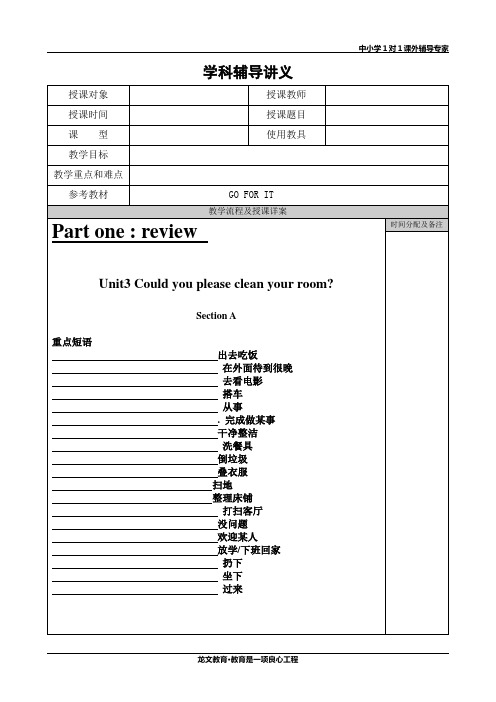
make sb. do sth.使某人做某事
enough stress足够的压力
waste 了
get good grades取得好成绩
mind doing sth.介意做某事
depend on依赖;依靠
2. I have to do some work.我必须干些活。
3. Could I+ do sth. ?
Could I use your computer?我可以用一下你的电脑吗?
4. She won’ t be happy if she sees this mess.
如果她看到这样乱七八糟的话,她会不高兴的。
develop children’s independence发展孩子的独立性
look after/take care of照顾;照看
do one’s part in (doing ) sth.做某人分内的事
二、重点句型
1. Could you please…..do sth. ?
Could you please clean your room?你能整理一下你的房间吗?
lend sb. sth.把某物借给某人
get sth. wet使某物弄湿
hate to do sth.讨厌做某事
do chores做杂务
help sb. (to ) d o /with sth帮助某人干某事
bring a tent带顶帐篷来
buy some snacks买些小吃
go to the store去商店
5. For one week, she did not do any housework andneither did I.
英语翻译课堂讲义

导学——课程要求
Requirements and Grading:
To pass this course, students must attain an average of 60% in the following categories: Participating: 10%
Participating is vital to the learning process and it includes attendances, being on times, coming to class prepared, interacting with other students, and participating in classroom discussions. Students who are frequently absent, tardy, or refuse to participate will receive a poor participation grade. Note: there are NO excused absences. Any absences or tardy will result in a lower participation grade.
3.《英汉翻译概要》,靳梅林 编著, 南开大学出版 社,1998年。
4.《新编汉英翻译教程》,陈宏薇 编著,上海外语教 育出版社,2004年。
5.《英汉翻译教程》,连淑能 编著,高等教育出版社, 2006年。
19
导学——学习网站
1. 中国翻译协会 /tran/index.htm 2. 中国科技翻译
Thursday
Classroom
IA3
14:00—16:00 p.m.
2018春新人教版七年级英语下册全课文翻译讲课讲稿

Unit1 翻译课文1a:我想加入美术俱乐部。
你会画画吗?是的,我会。
你会游泳吗?不,我不会。
我想加入音乐俱乐部。
你会唱歌吗?是的,我会。
2a:你想加入什么俱乐部?我想加入国际象棋俱乐部。
2d:你好,鲍勃,你想加入什么俱乐部?我想加入运动俱乐部。
棒极了,你会玩什么运动?足球这么说你可以加入足球俱乐部。
那么你呢?你非常善于讲故事,你可以加入讲故事俱乐部。
听起来不错。
但我也喜欢画画。
那就加入两个俱乐部,讲故事俱乐部和美术俱乐部。
好的,让我们现在去加入吧!G rammar focus你会游泳吗?是的,我会。
不,我不会。
他会下国际象棋吗?是的,他会。
不,他不会。
你们会说英语吗?是的,我们会。
不,我们不会。
简和吉尔会游泳吗?是的,他们会。
不,他们不会。
你们想加入什么俱乐部?我们想加入国际象棋俱乐部。
3b:学校演出招募学生我们的学校演出需要学生,你会唱歌会跳舞吗?你会弹吉他吗?你会讲故事吗?请放学后跟张老师说。
Section B2a :你好,我是彼得,我喜欢打篮球。
我会说英语,我也会踢足球。
你好,我是马欢,我会打乒乓球和下国际象棋。
我喜欢与人们交谈和做游戏。
我的名字是艾伦。
我在学校音乐俱乐部。
我会弹吉他和钢琴。
我也会唱歌和跳舞。
2b: 我们老人之家需要帮助。
在七月份你有空吗?你善于与老人相处吗?你会与他们说话做游戏吗?他们会给你讲故事,你们可以交朋友。
它既有趣又好玩!请在今天拨打电话 698-7759与我们联系。
放学后你忙吗?不忙。
你会说英语吗?是的。
那么,我们需要你帮助说英语的学生做运动。
这是轻松的,容易的!请来学生运动中心吧。
拨打电话 293-7742联系布朗先生。
你会弹钢琴或者拉小提琴吗?在周末你有时间吗?学校需要帮助教音乐。
它不难!Unit2 翻译课文1a:里克,你通常几点起床?我通常六点半起床。
1c:里克,你通常几点洗淋浴?我通常六点四十洗淋浴。
2d:斯哥特有一份有趣的工作。
他在一家广播电台工作。
Unit6课时2SectionB(教师版)九年级英语全一册讲义(人教版)

Unit 6 When was it invented?知识精讲知识点01 make+宾语+宾语补足语的用法【课文详解】George wanted to make the customer happy.乔治想让那位顾客满意。
【句型剖析】本句中“make the customer happy”是“make+宾语+宾语补足语”结构,宾语补足语由形容词充当。
除形容词外,介词短语、名词、不带to的不定式、分词都可作宾语补足语。
Reading books makes us clever.读书使我们聪明。
The boss makes the workers work ten hours a day.老板让工人们每天工作10个小时。
【即学即练】Many people like to make resolutions ________ themselves at the beginning of the year. A.improved B.to improve C.improving【答案】B【详解】句意:许多人喜欢在年初下决心提高自己。
考查非谓语动词。
make resolutions to do sth.为固定搭配,意为“下决心做某事”,符合句意,故选B。
知识点02 the Olympics的用法【课文详解】Then in1936 in Berlin, it became an event at the Olympics.1936年在柏林,它成为奥运会的一个项目。
【句型剖析】the Olympics 奥林匹克运动会与the Olympic Games同义,作主语时,谓语动词常用复数形式。
【即学即练】—In 2022, the Winter Olympics ________ in Beijing in China, from the 4th to the 20th of February. —This is ________ time in Chinese history. Beijing is the world’s first city to host both the Summer and Winter Games.A.were held; second B.will be held; the secondC.were held; the first D.are held; first【答案】C【详解】句意:——2022年2月4日至20日,冬奥会在中国北京举行。
Unit10课时2SectionB(教师版)七年级英语下册讲义(人教版)

Unit 10 I’d like some noodles.SectionB知识精讲Point 1 fish鱼;鱼肉(1)fish作可数名词时,意为“鱼”,表示数量时单复数同形;表示种类时其复数要加心。
I have three fish at home.我家里有三条鱼。
There are different kinds of fishes in the sea.大海里有各种各样的鱼。
(2)fish作不可数名词时,意为“鱼肉”。
I like eating fish.我喜欢吃鱼肉。
(3)fish作动词时,意为“钓鱼”。
My father loves to fish.我父亲喜欢钓鱼。
Point 2 I don’t like onions, green tea or porridge. 我不喜欢洋葱、绿茶和粥。
or此处作并列连词,意为“或者,和”,常用于否定句中,肯定句中用and。
I don’t like chicken or beef.我不喜欢鸡肉和牛肉。
I like onions, green tea and porridge.我喜欢洋葱、绿茶和粥。
【拓展】①or用在选择疑问句中,意为“或;还是”。
—Is your younger brother tall or short?你弟弟个子高还是矮?—He is tall.他个子高。
②or用于否定词后,意为“也不”。
He never smokes or drinks.他从不抽烟,也不喝酒。
③or用于“祈使句+or+简单句”句型中,意为“否则”。
Hurry up, or you’ll be late for class.快点儿,否则你将上课迟到。
Point 3 Birthday Food Around the World 世界各地的生日食品around the world意为“世界各地”,相当于all over the world,此处为介词短语,作后置定语。
初一英语讲义 第十讲

Unit 11 what time do you go to school ?一. [话题](Topic):谈论时间二.[重点词组](Key Phrases)1. do morning exercise 做早操2. have lessons 上课3. play football 踢足球4. do some cleaning 做清洁5. play the piano 弹钢琴6. watch TV 看电视7. listen to the radio 听收音机8. read newspapers 看报纸9. log in line 上网/ surf in line, surf the internet.10. cook supper 做晚饭11. write my diary 写日记12. do some washing 洗东西13. play chess 下棋14. play computer games 玩电子游戏三.[交际用语]1. What time do you get up? I get up at six o’clock.2. What time does he /she eat breakfast?3. He/She eats breakfast at seven o’clock.4. When do people usually eat diner?5. People usually eat dinner in the evening.6. When does Rick usually get up? He usually gets up at…四. [重点难点释义](Language Points)1.get up 是一个固定词组,意为“起床” .相似的说法还有“be up”.如: He gets up very early. = He is up very early.另外,get 与不同的词组搭配,还有很多固定词组.如:get back 归还,取回.get home 到家get …for 为某人拿/买…get …from 从某人那得到2. go to school “上学”是一个固定词组,go 也有很多的固定搭配。
初一英语讲义 第八讲
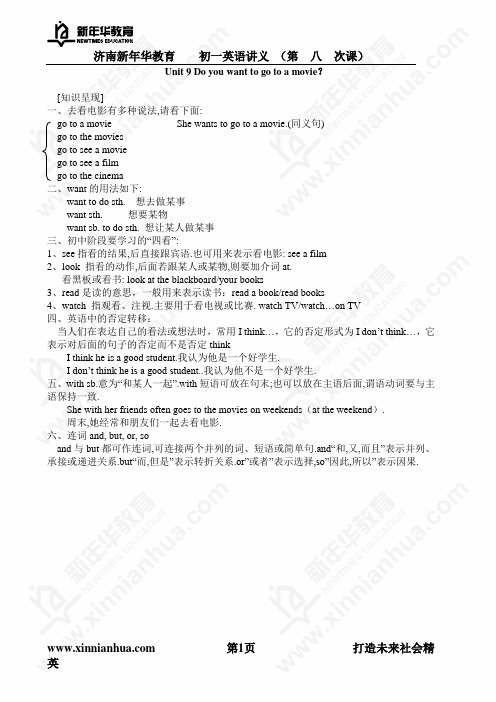
Unit 9 Do you want to go to a movie?[知识呈现]一、去看电影有多种说法,请看下面:go to a movie She wants to go to a movie.(同义句)go to the moviesgo to see a moviego to see a filmgo to the cinema二、want的用法如下:want to do sth. 想去做某事want sth. 想要某物want sb. to do sth. 想让某人做某事三、初中阶段要学习的“四看”:1、see指看的结果,后直接跟宾语.也可用来表示看电影: see a film2、look 指看的动作,后面若跟某人或某物,则要加介词at.看黑板或看书: look at the blackboard/your books3、read是读的意思,一般用来表示读书:read a book/read books4、watch 指观看、注视.主要用于看电视或比赛. watch TV/watch…on TV四、英语中的否定转移:当人们在表达自己的看法或想法时,常用I think…,它的否定形式为I don’t think…,它表示对后面的句子的否定而不是否定thinkI think he is a good student.我认为他是一个好学生.I don’t think he is a good student..我认为他不是一个好学生.五、with sb.意为“和某人一起”.with短语可放在句末;也可以放在主语后面,谓语动词要与主语保持一致.She with her friends often goes to the movies on weekends(at the weekend).周末,她经常和朋友们一起去看电影.六、连词and, but, or, soand与but都可作连词,可连接两个并列的词、短语或简单句.and“和,又,而且”表示并列、承接或递进关系.but“而,但是”表示转折关系.or”或者”表示选择,so”因此,所以”表示因果.目标检测一、图词配对,下面每幅图片代表不同影片,请把它们分辨出来。
Unit7要点 讲解 讲义--2021-2022学年人教版英语八年级下册
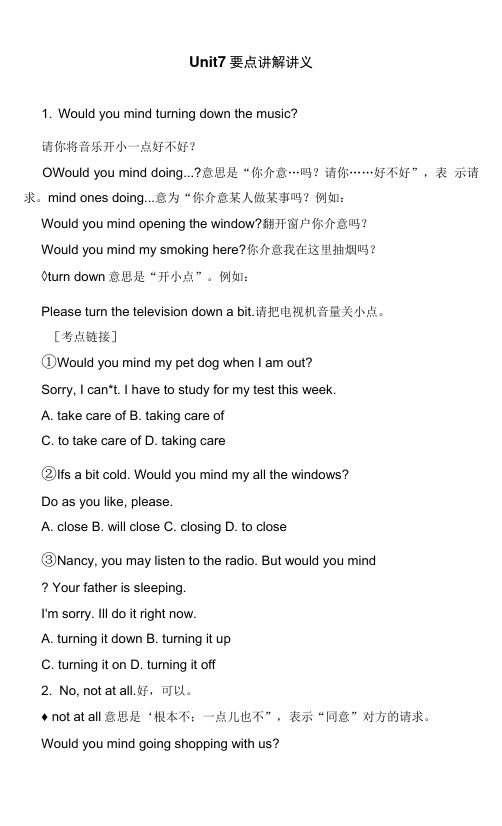
Unit7要点讲解讲义1. Would you mind turning down the music?请你将音乐开小一点好不好?OWould you mind doing...?意思是“你介意…吗?请你……好不好”,表示请求。
mind ones doing...意为“你介意某人做某事吗?例如:Would you mind opening the window?翻开窗户你介意吗?Would you mind my smoking here?你介意我在这里抽烟吗?◊turn down意思是“开小点”。
例如:Please turn the television down a bit.请把电视机音量关小点。
[考点链接]①Would you mind my pet dog when I am out?Sorry, I can*t. I have to study for my test this week.A. take care ofB. taking care ofC. to take care ofD. taking care②Ifs a bit cold. Would you mind my all the windows?Do as you like, please.A. closeB. will closeC. closingD. to close③Nancy, you may listen to the radio. But would you mindYour father is sleeping.I'm sorry. Ill do it right now.A. turning it downB. turning it upC. turning it onD. turning it off2. No, not at all.好,可以。
♦ not at all意思是‘根本不;一点儿也不”,表示“同意”对方的请求。
初三英语公开课讲义

初三英语公开课讲义一、翻译下列词组。
1.一部由某人导演的恐怖片____________________2.自杀__________________________3.找到答案____________________________4.充满恐怖和悬念_________________5.容易受到惊吓_______________________________6.表现出色___________________7.一部一小时的记录片__________________8.为……而被捕杀__________________9.一个动物爱好者________________10.有点心神不安的____________________________ 11.自然栖息地________________12.因……而获奖__________________13令人惊叹的摄影____________________________ 14.被发现死亡____________________15 谈话节目__________________________________二、用所给词适当形式填空。
1. Zhang Yimou is a famous ___________ who ___________ the film Hero. (direct)2. The rich woman ____________________ last night. (murder)3. In the film, a doctor is found ___________ (die) in the house.4. He won’t go to school until his mother ____________ (come) back.5. She was crying while her mother _______________ (cook).6. Y ou’ll feel happy while ____________ (listen) to the music.7. The Music Awards _________________ (broadcast) on Channel 6 tomorrow.8. There _______ (be) a number of trees along the river.9. The documentary explains that these tigers are____________ (kill) for their skin and bones.10. Tiger Watch ______________ (film) in India between 2004 and 2006.11. I like watching _____________ (documentary) because I learn a lot from them.12. This week there will be some ____________ (comedy) on Channel 5.三、单项选择。
汉英翻译presentation讲课讲稿

Notes:
此句内容排列相似。 适当用多种句型使表 达丰富。 第一句改后比较符合 英文表达习惯。
02 文本翻译 Translation
同时,我们对有限资源的有效利用不够,粗放型的经济结构浪费了大量 资源; 大量高耗能建筑拔地而起的同时也宣告了高能耗的持久性; Original: At the same time, we do not make effective use of resources, and extensive economic structure waste a lot of resources. A large number of high energy-consuming buildings show the durability of high energy consumption.
要保持经济可持续性发展,保证人类的发展需要,就要在全社会倡导建设节 约型社会。建设节约型社会,要搞好宣传教育。认识是行动的先导,建设节 约型社会首要是提高全民的思想认识。 Original: We need to promote constructing conservation-minded society if we want to maintain sustainable economic development and ensure people’s developing needs. Constructing conservation-minded society needs good publicity. As cognition is the guide of actions, the first thing of establishing conservation-minded society is to enhance people’s ideological understanding. Revised: We need to promote constructing conservation-minded society if we want to maintain sustainable economic development and ensure people’s developing needs. Constructing conservation-minded society requires good publicity. As cognition is the guide of actions, the first thing of establishing conservation-minded society is to enhance people’s ideological understanding.
Unit2课时2SectionB(教师版)九年级英语全一册讲义(人教版)
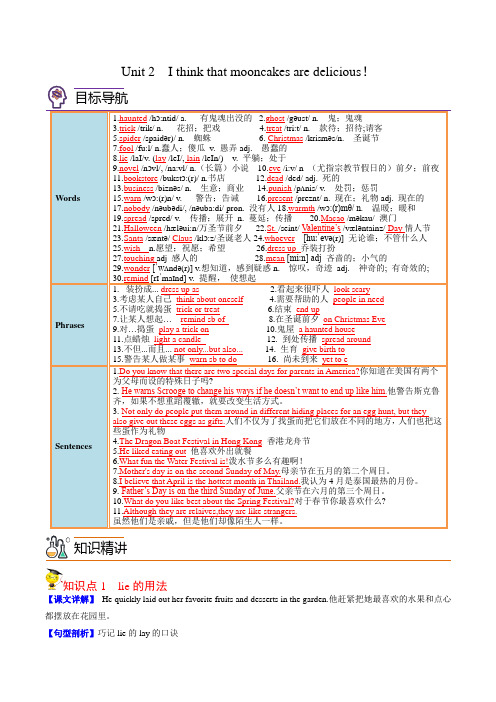
Unit 2 I think that mooncakes are delicious ! Words1.haunted /h ɔ:ntid/ a. 有鬼魂出没的2.ghost /g əust/ n. 鬼;鬼魂3.trick /trik/ n. 花招;把戏4.treat /tri:t/ n. 款待;招待;请客5.spider /spaid ər)/ n. 蜘蛛6. Christmas /krism əs/n. 圣诞节7.fool /fu:l/ n.蠢人;傻瓜 v. 愚弄adj. 愚蠢的8.lie /laI/v. (lay /leI/, lain /leIn/) v. 平躺;处于9.novel /n ɔvl/, /na:vl/ n.(长篇)小说 10.eve /i:v/ n (尤指宗教节假日的)前夕;前夜 11.bookstore /bukst ɔ:(r)/ n.书店 12.dead /ded/ adj. 死的 13.business /bizn əs/ n. 生意;商业 14.punish /p ʌnis/ v. 处罚;惩罚 15.warn /w ɔ:(r)n/ v. 警告;告诫 16.present /preznt/ n. 现在;礼物adj. 现在的 17.nobody /n əub ədi/, /n əuba:di/ pron. 没有人18.warmth /w ɔ:(r)mθ/ n. 温暖;暖和19.spread /spred/ v. 传播;展开 n. 蔓延;传播 20.Macao /m əkau/ 澳门 21.Halloween /hæl əui:n/万圣节前夕 22.St. /seint/ Valentine’s /væl əntainz/ Day 情人节 23.Santa /sænt ə/ Claus /kl ɔ:z/圣诞老人24.whoever [huːˈevə(r)] 无论谁;不管什么人 25.wish n.愿望;祝愿;希望 26.dress up 乔装打扮 27.touching adj 感人的 28.mean [miːn] adj 吝啬的;小气的 29.wonder [ˈwʌnd ə(r)] v.想知道,感到疑惑n. 惊叹,奇迹 adj. 神奇的; 有奇效的; 30.remind [r ɪˈma ɪnd] v. 提醒, 使想起 Phrases1. 装扮成... dress up as2.看起来很吓人 look scary3.考虑某人自己 think about oneself4.需要帮助的人 people in need5.不请吃就捣蛋 trick or treat6.结束 end up7.让某人想起… remind sb of8.在圣诞前夕 on Christmas Eve9.对…捣蛋 play a trick on 10.鬼屋 a haunted house 11.点蜡烛 light a candle 12. 到处传播 spread around 13.不但...而且... not only...but also... 14. 生育 give birth to 15.警告某人做某事 warn sb to do 16. 尚未到来 yet to e Sentences 1.Do you know that there are two special days for parents in America?你知道在美国有两个为父母而设的特殊日子吗? 2. He warns Scrooge to change his ways if he doesn’t want to end up like him .他警告斯克鲁齐,如果不想重蹈覆辙,就要改变生活方式。
+Unit11讲义 人教版英语七年级下册
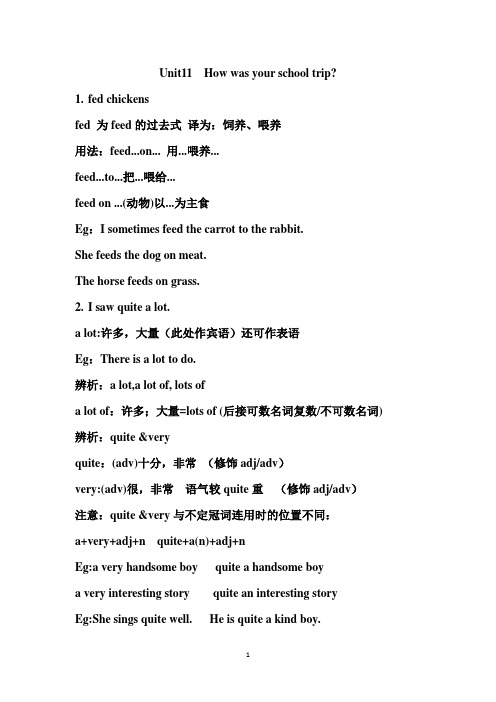
Unit11 How was your school trip?1.fed chickensfed 为feed的过去式译为:饲养、喂养用法:feed...on... 用...喂养...feed...to...把...喂给...feed on ...(动物)以...为主食Eg:I sometimes feed the carrot to the rabbit.She feeds the dog on meat.The horse feeds on grass.2.I saw quite a lot.a lot:许多,大量(此处作宾语)还可作表语Eg:There is a lot to do.辨析:a lot,a lot of, lots ofa lot of:许多;大量=lots of (后接可数名词复数/不可数名词) 辨析:quite &veryquite:(adv)十分,非常(修饰adj/adv)very:(adv)很,非常语气较quite重(修饰adj/adv)注意:quite &very与不定冠词连用时的位置不同:a+very+adj+n quite+a(n)+adj+nEg:a very handsome boy quite a handsome boya very interesting story quite an interesting storyEg:She sings quite well. He is quite a kind boy.This kind of fruit is very healthy. Thank you very much.3.Did you learn anything?辨析:anything&somethinganything:(不定代词)任何事物;某事物(常用于否定句/疑问句中) something:(不定代词)某事(常用于肯定句中) 但是在表示请求、建议、或征求意见的疑问句中常用something注意:(1)adj修饰不定代词,要位于其后(2)不定代词作主语时,谓语动词用单数形式(3)补充其他不定代词some any no every/body thing oneEg:There isn’t anything wrong.There is something wrong with my computer.4.The farmer showed Carol around the farm.farmer:(n)农民farm:(n)农场;(v)干农活farming:(不可数n)农事Eg:The farmers are working on the farm,and there is too much farming.show sb.around...带某人到处参观...Eg:The guide shows us around the museum.与show相关的短语:show sb.sth=show sth.to sb.给...看展示on show 展览show off 炫耀show up出现5.The farmers don’t grow apples.grow:(vt)种植;栽培(vi)生长;发育Eg:Farmers in the south of China mainly grow rice.Everything begins to grow in spring.短语:grow up成长,长大grow into成长为;发展成(由一种情况变成另外一种情况)Eg:I want to be a guide when I grow up.She grows into a lovely girl.辨析:grow&plantgrow: 种植(强调过程/状态)plant:(v)种植(仅表示栽入土中,表示动作)(n)植物Eg:The farmers grow a lot of trees every year.The farmers plant lots of trees every year.There are many different plants in the garden.6....we worried it would rain.worry:(vt)担心;担忧后常接宾语从句Eg:His parents worry that their child will sick.(vt)使担心;使发愁(常接sb.作宾语)Eg:The naughty boy worries his parents.worry about sb./sth.=be worried about sb./sth. 担心某人/某事Eg:Don’t worry about me ./Don’t be worried about me.7.Luckily,it didn’t,and the sun came out again.(1)luckily(adv)幸运地常用于句首,用逗号隔开unluckily不幸地unfortunately fortunate(adj)幸运的fortunately(adv)幸运地以辅音字母+y结尾的形容词变成副词的方法:改y为i再加ly Eg:happy lucky busy angry easy(2)sun moon earth star 都是世界上独一无二的事物,前面必须加the(3)come out出来;发芽;开花;出版与come相关的短语:come from来自come on加油;快点come back 回来come down 下来come in 进来come up with 提出;想出;赶上come across遇到8.expensive/cheapexpensive/cheap只能形容事物的贵贱;当谈论价格(price)时,只能用high/lowEg:The pen is cheap.=The price of the pen is low.9.All in all,it was an exciting day.all in all:总的来说;总之in a word:简言之in short:总之Eg:All in all, it’s good for you to do more exercise.辨析:all in all, in all,at allall in all:总的来说(常用于句首)eg:All in all, we had a good time. in all:总共;合计(句首/句末)eg:There are fifty students in all.at all:根本常用于“not at all”根本不Eg:He doesn’t like apples at all.与all相关的短语:all the time 一直after all 毕竟10.I didn’t like the trip at all.Not at all 用于回答感谢/道歉Eg:---Thank you very much.---Not at all.其它的回答:It’s my pleasure. It’s a pleasure. No problem.You’re welcome. That’s all right. That’s OK.一般过去时态含义:表示过去某个时间发生的动作或存在的状态,也表示过去经常或反复发生的动作。
初中英语说课稿模板(英文版、中文版)
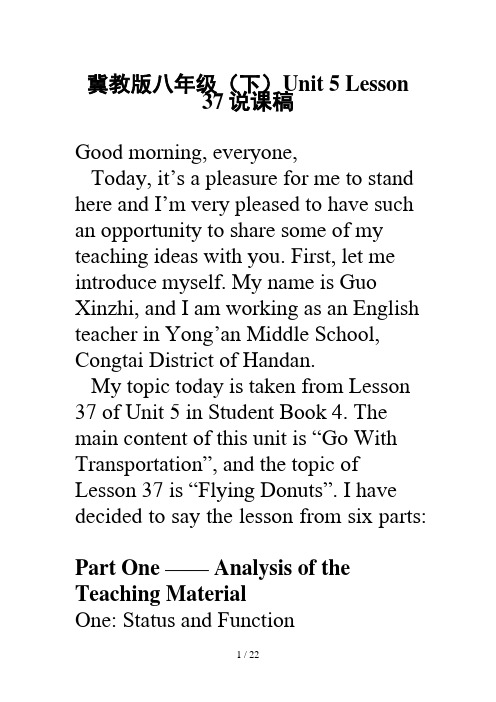
冀教版八年级(下)Unit 5 Lesson37说课稿Good morning, everyone,Today, it’s a pleasure for me to stand here and I’m very pleased to have such an opportunity to share some of my teaching ideas with you. First, let me introduce myself. My name is Guo Xinzhi, and I am working as an English teacher in Yong’an Middle School, Congtai District of Handan.My topic today is taken from Lesson 37 of Unit 5 in Student Book 4. The main content of this unit is “Go With Transportation”, and the topic of Lesson 37 is “Flying Donuts”. I have decided to say the lesson from six parts: Part One——Analysis of the Teaching MaterialOne: Status and Function1. This unit tells us the improvement of traffic transportation and the related stories. Besides learning this, students will also learn some words, phrases and expressions of traffic, and so on. In Lesson 37, Danny will introduce a new type of transportation to us, it is imaginary.2. To attain “four skills” request of listening, speaking, reading and writing, I will have the students do some exercise about the text.3. Such a topic is very important in this unit. I will lead the students to use their imagination and encourage them to be creative. For example, helping them use English to describe their imaginary transportation. So I think if the students can learn this lesson well, it will be helpful to make them learn the rest of this unit.4. While teaching them, I will also encourage them to say something about what they think the future transportations will be like. In a way, from practising such a topic, it can be helpful to raise learning interests of students and it will be also helpful to improve their spoken language. Two: Teaching Aims and Demands The teaching aim's basis is established according to Junior School English syllabus' provision.1. Knowledge objects(1) To study the new words “fuel”, “oil” and “coal”.(2) To learn and master the phrases “think of, on the way to …, have fun”, etc.2. Ability objects(1) To develop the students’abilities of listening, speaking, reading and writing.(2) To train the students’ ability of working in pairs.(3) To develop the students’abilities of communication by learning the useful structures.3. Moral objects(1) Through different teaching methods to make students be interested in study.(2) Love to know more knowledge about transportation and dare to express their opinions in English.(3) Encourage the students to be more creative and try to make contributions to making new inventions in the future.Three: Teaching Keys and Difficult PointsThe teaching keys and difficult points’ basis is established according to Lesson 37 in the teaching material's position and function.1. Key points:(1).Be able to express words, phrases and sentences in English.(2). Know about the improvementof transportation and Danny’s invention.2. Difficult points:Be able to talk about their imaginary future transportation in oral English.Part Two——The Teaching Methods1. Communicative teaching method;2. Audio-visual teaching method;3. Task-based teaching method;4. Classified teaching method.As we all know: the main instructional aims of learning Englishin the Middle School is to cultivate students’ abilities of listening, speaking,reading, writing and their good sense of the English language. So in this lesson I’ll mainly use “Communicative”teaching method, “Audio-visual”teaching method and “Task-based”teaching method and “Classified”teaching method. That is to say, I’ll let the students get a better understanding of the key structures. I’ll give the students some tasks and arrange some kinds of activities, like talking, watching CAI, and reading in roles.In a word, I want to make the students the real masters in class while the teacher himself acts as director. I also hope to combine the language structures with the language functions and let the students receive some moral education while they are learning the English language.Part Three——Studying ways1. Teach the students how to be successful language learners.2. Make situation and provide meaningful duty, encourage the students to study the text by themselves. Part Four——Teaching stepsAs this lesson plays an important part in the English teaching of this unit, I have decided the following steps to train their ability of listening, speaking, reading and writing, especially reading and speaking ability.The entire steps are:Step1 Warm-up and Lead-inShow the students some pictures of common transportations, like car, bike, train and so on. Ask the students: What can you see from the picture? Is there another kind of transportation around us?Purpose of my designing: In this part, have the students say more about what they see or what they don’t see. In this way, they will know today’s lesson has something to do with their discussion.Step2 Presentation1. Learn new words in groups. The new word in this lesson are fuel, oil and coal. Show them pictures of these things and teach them these new words.Purpose of my designing: After seeing the pictures, the students will know what they are and they can learn them quickly and easily.2. Play the tape recorder. Let the students listen and imitate the text. Pay attention to their pronunciation and intonation. Then finish the exercises on the computer.Purpose of my designing: This step is employed to make the students getthe general idea of the text. At the same time let the students have a chance to practise their listening and speaking ability.3. Text Learning and a QuizI’ll use CAI to present the whole text. I’ll write the key points on the blackboard while they are watching. After watching, I’ll teach them to read the words and sentences on the Bb. Make sure they can read them well.After teaching them the whole text, including the meanings of new words, the use of similar expressions and so on. Get the students to try and say out some phrases on the screen, like I don’t think so, have fun, a new kind of, on the way to school, and so on.Purpose of my designing: To present the text by CAI is much easier for the students to learn and grasp the meanings. CAI can provide a realsituation with its sound and picture and it makes the relationships between the students better.4. Key Structures and Difficult Points LearningFirst, I will divide the students into three groups and tell them to have a discussion about what they learn in this lesson. Then encourage them to try to understand the whole text, know what the difficult points are, and so on. At last, I will help them to master them all.For example, I teach the students know the differences between phrases think of, think about and think over. I will show them some sentences and get them to know the use of these phrases. Encourage them to do some exercise about these phrases.Purpose of my designing: By practising using these new words and similar phrases, the students will knowhow to use them in English and master the use of them better.5. Read and SayGive the students two or three minutes to prepare, and then get them read the text together in three groups. Tell them to read aloud.Then help the students say something about the future transportation or their imaginary transportation. Encourage them to say more.Purpose of my designing: By reading the text and saying such things, get the students to practise their reading and speaking ability again.Part Five——Summarize and HomeworkAsk the students such questions:What have we learned from this lesson? What does Danny say about his new kind / type of transportation? Doyou like his idea? What new phrases have we learned today? Do you have enough confidence to finish these exercises? Now, let’s try!Then show them some exercises and help them to finish them.At last, tell the students what today’s homework is. While doing this, the teacher can have the boys and girls have a competition to see who are better.Part Six——Blackboard DesigningPurpose of my designing: Presents the text key content clearly on the blackboard, favors the students to knowledge grasping.OK. That’s all. Thanks for listening to me and helping me.初中英语说课稿各位评委,老师:下午好!今天我说课的内容是《仁爱英语》七年级上册Unit 4 Topic 1的Section A。
人教版初中英语七年级下册《It’s raining》优质课公开课课件、教案
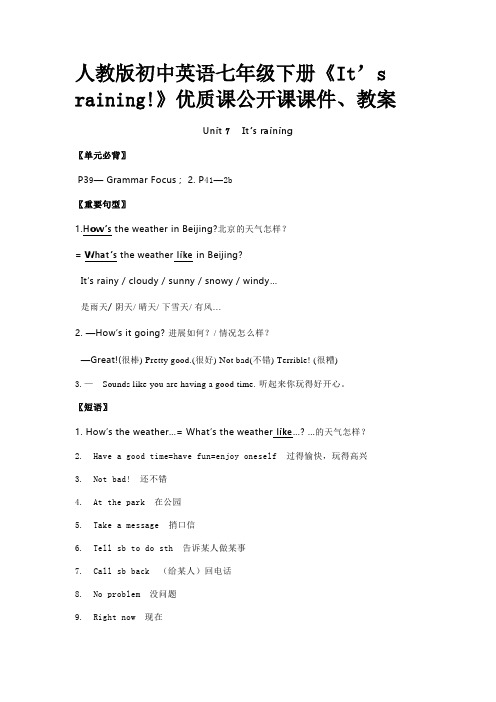
人教版初中英语七年级下册《It’s raining!》优质课公开课课件、教案Unit 7 It’s raining〖单元必背〗P39— Grammar Focus ; 2. P41—2b〖重要句型〗1.How’s the weather in Beijing?北京的天气怎样?= What’s the weather like in Beijing?It’s rainy / cloudy / sunny / snowy / windy…是雨天/ 阴天/ 晴天/ 下雪天/ 有风…2. —How’s it going? 进展如何?/ 情况怎么样?—Great!(很棒) Pretty good.(很好) Not bad(不错) Terrible! (很糟)3.—Sounds like you are having a good time. 听起来你玩得好开心。
〖短语〗1. How’s the weather...= What’s the weather like...? …的天气怎样?2. Have a good time=have fun=enjoy oneself 过得愉快,玩得高兴3. Not bad! 还不错4. At the park 在公园5. Take a message 捎口信6. Tell sb to do sth 告诉某人做某事7. Call sb back (给某人)回电话8. No problem 没问题9. Right now 现在10. Summer school 暑期学习班11. Make snowmen 堆雪人12. Some of my old friends 我的一些老朋友13. Summer vacation 暑假14. Write to sb=write a letter to sb 写信给某人15. Just right 正好16. Wear hats and sweaters 戴帽子,穿毛衣17. Take home 带回家18. Take a photo=take photos 照相19. Ask sb to do sth 要求某人做某事20. On (a) vacation 度假〖知识要点〗1. What’s the weather like… = How’s the weather…?…的天气怎样/ 如何?(询问天气情况)回答时应使用表天气情况的形容词,如:rainy(有雨的;多雨的),sunny(晴朗的),snowy(下雪的),cloudy(多云的;阴天的),windy(多风的;有风的),warm(暖和的),cold(寒冷的),cool(凉爽的;凉快的),humid(潮湿的;润湿的)eg.①It’s warm in Ha i nan.(对划线部分提问)_______ _____ ________ like in Ha i nan?②—How’s the weather today? —It’s _______.A. cloudB. rainC. snowD. windy同时注意:rain, snow, wind是不可数名词。
- 1、下载文档前请自行甄别文档内容的完整性,平台不提供额外的编辑、内容补充、找答案等附加服务。
- 2、"仅部分预览"的文档,不可在线预览部分如存在完整性等问题,可反馈申请退款(可完整预览的文档不适用该条件!)。
- 3、如文档侵犯您的权益,请联系客服反馈,我们会尽快为您处理(人工客服工作时间:9:00-18:30)。
bread. • 17.What time did you eat ___ yesterday
Old friend' why are ou so shy?
or hide from the light
I hate to turn up out of the blue uninvited
这个美炸了
• 1.我很喜欢它. • I very like it. • 1.I like it very much. • 2.用英语怎么说? • How to say in English? • How do you say this in
English?
3.我没有英文名. I have not English name. I don not have an English name.
• I do not think you have enough money to buy this. • 我不认为你有足够的钱买这个。 • 我认为你没有足够的钱买这个。 • Do not trouble trouble,till trouble troubles you. • 别麻烦麻烦,直到麻烦麻烦你。 • 别去招惹麻烦,除了麻烦来找你。(别自找麻烦)
1.上周我和我的朋友下棋。 2.我经常帮我的父母做家 务活。 3.妈妈总是让我做作业。 4.他们决定去北京度假。 5.你不可以在这里停车。
• 1.Gone with the wind.
• 2.You must be quiet here.
• 3.We went the forest and had fun.
24.He has a dog, a cat ___ a rabbit.
• Down (纵向) • 1.My___is 65 years old. • 2.___Time will you go home? • 3.The police tried to ___the thief. • 4. How old will you be on your next ___? • 5.Have you seen the ___ forcast for
Do you know me
now?
• FIRSTLY, do not gossip. • Secondly,English first. • Thirdly,concentrate your
attention.
Wow!what is this?
• Across (横向) • 1.Let's ___to a movie? • 5.Did you ___TV last night? • 7.Please put the book on the ___. • 8.She ran ___ her dog. • 9.I got up at ___ 6:30 • 11.___ You like baseball? • 12.Please give this to ___ man. • 14.I have a dog and a ___. • 16.It's really hot ___. • 18.___ Is my book. • 19.He took the ___ road. • 20.A ___ has long ears. • 23.Do you ___ to eat lunch now?
• 4.I do not think you can be there on time.
• • •
通
忠
信
顺
实
达
雅
• I did not live until this time, Crown'd my felicity, When I could say without a crime,
evening? R • 21.The baseball player picked up the ___.
22.Would you like a cup of ___?
英语学习的主要五个方面:
listening 听力
reading阅读
我们今 天学习 一些翻 译技巧
comprehensive综合 writing 写作 translating 翻译
I heard that you're settled down
That you found a girl and you're married now
I heard that your dreams came true
Guess she gave you things I didn't give to you
GO FOR IT
Good morning everyone, how r u? May I introduce myself first, my name is HuangQi,and you can just simply call me Miss Huang in the class,I am very glad to be your English teacher in the next few days , and I really hope I could be your friend as well but not only your teacher.If there is any inconvenience between us, please do tell me, than I could make a little notice on the next time. And if you have any questions wanna ask, please don't be shy. Ok, just before I start this lesson, if you do have any questions about me right now, I am listening.
